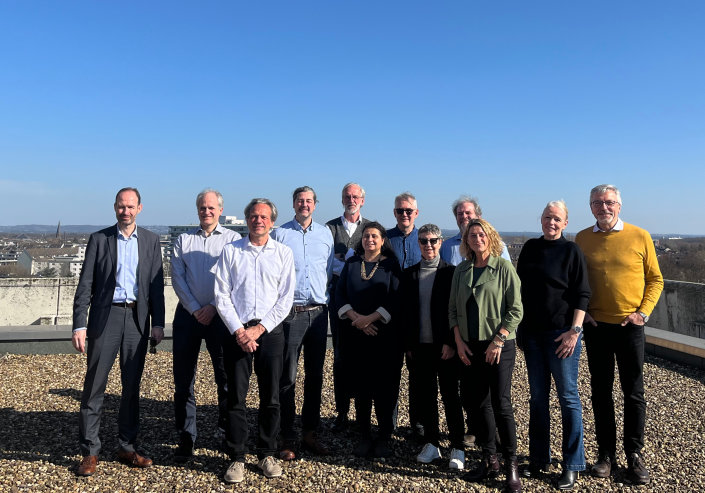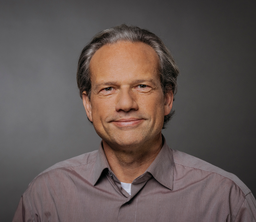Meeting of the Scientific Advisory Board of the German National Committee IHP, HWRP at TH Köln
Under the chairmanship of Prof. Dr. Lars Ribbe (Faculty of Spatial Development and Infrastructure Systems), the 83rd meeting of the Scientific Advisory Board of the National Committee for the International Hydrological Programme (IHP) of UNESCO and the Hydrology and Water Resources Programme (HWRP) of the World Meteorological Organization (WMO) took place at TH Köln on 6 March 2025.
Key topics of international water research, cooperation with global institutions and strategic issues of science communication were discussed.
 Members of the Scientific Advisory Board
(Image: Chahinaz Ziani)
Members of the Scientific Advisory Board
(Image: Chahinaz Ziani)
Strengthening international cooperation
The meeting focused on the question of how international water research can be effectively advanced - not least in view of current geopolitical and scientific challenges. A key aspect of the discussion was the need to strengthen international cooperation, even if current geopolitical conditions, particularly with regard to the USA, make this more difficult and have an impact on the availability of funding, for example. The fact that the political significance of climate change and sustainability is decreasing globally highlights the need for strategic adaptation and reorientation of water research. Improved data exchange also plays an important role here, in order to facilitate access to and the use of open hydrological data and thus strengthen international and national research cooperation.
In preparation for the 2026 UN Water Conference, the Council suggested that German water research should be better integrated into the global UN water agenda, in particular through targeted cooperation with institutions such as the Food and Agriculture Organization (FAO) and the World Health Organization (WHO) and through greater involvement of young researchers. Planned international initiatives, such as pilot projects in Central Asia and the Nile Basin, illustrate the global approach, with the Council emphasizing that strategies for sustainable water management need to be developed at both national and international level.
Intensifying networking and interdisciplinarity
The Council also called for stronger networking between water research and other disciplines and the promotion of interdisciplinary approaches in order to highlight the role and contribution of water research to societal challenges. Communicating scientific findings more effectively to policymakers and society is also key here, which could be supported by, among other things, stronger networking with political decision-makers, especially local authorities. The involvement of young scientists, particularly 40-year-old professors, in networks and research projects was seen as essential. The use of “water research” instead of “hydrology” should also reach a broader scientific target group.
Overall, the Scientific Advisory Board emphasized the importance of targeted funding and international cooperation for sustainable and future-oriented water research that simultaneously responds to global challenges and is more firmly anchored within the scientific community.
---
The German National Committee (NK) for the Intergovernmental Hydrological Programme (IHP) of UNESCO and the Hydrology and Water Resources Programme (HWRP) of the WMO (World Meteorological Organization) ...
...was established in 1974. The NK is made up of representatives from ministries, federal and state administrations and experts from research and education. The annual meetings of the National Committee take place in Berlin and are chaired by the Federal Foreign Office. The Scientific Advisory Board of the National Committee supports the IHP/HWRP Secretariat, which is responsible for implementing the resolutions of the National Committee. The Secretariat, which is an integral part of the International Centre for Water Resources and Global Change (ICWRGC), receives financial support from the Federal Ministry of Transport and Digital Infrastructure, the Federal Ministry for the Environment, Nature Conservation, Building and Nuclear Safety and the Federal Foreign Office. Chairman of the Scientific Advisory Board since February 2024 is Prof. Dr. Lars Ribbe, Dean of the Faculty of Spatial Development and Infrastructure Systems at TH Köln.
---
Personen auf dem Bild oben (v.l.n.r.):
Thomas Mützelburg, German Foreign Office, Berlin, Dr.-Ing. Jörg Dietrich, Leibniz University Hanover, Prof. Dr. Lars Ribbe (Chairman), TH Köln – University of Applied Sciences, Cologne, Dr. Stephan Dietrich, ICWRGC, Prof. Dr.-Ing. Heribert Nacken, RWTH Aachen, PD Dr. Luna Bharati, ICWRGC, Prof. Bodo Ahrens, Goethe University Frankfurt/Main, Prof. Dr. Elisabeth Irmgard Meyer, University of Münster, Dr. Frank Kaspar, German Weather Service, Offenbach, Prof. Dr. Mariele Evers, University of Bonn, PD Dr. Petra Herzog, Federal Institute for Hydrology, Koblenz, Prof. Dr.-Ing. Markus Disse, Technical University of Munich
March 2025

